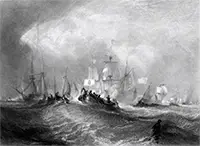The Batavian Revolution and Republic
Part 1: The Revolution The Batavian Revolution and Republic occurred during a time of great upheaval in the Netherlands and were a transition from representative government to monarchy. The revolution occurred in the late 18th Century, and the resulting republic lasted for a decade. 
By the beginning of the 18th Century, the days of the Dutch Golden Age were few. William III of Orange (right) was, as of 1688, also King of England, ruling jointly with his wife, Mary. Dutch troops fought alongside British troops in the War of the Spanish Succession, during the first quarter of the 18th Century. The war ended the way that the Dutch wanted it to, but the war had also drained the republic's coffers and much of the financial reserves. Things 
During the 17th Century, Great Britain and the Netherlands had fought three wars, with varying results in political terms but startling ramifications in the economic realm. Dutch and British forces again went to war in 1780, nearly a century after the last conflict, just as the latter's war against its American colonies was winding down. The Dutch East India Company had declined along with the Dutch navy during the latter half of the 18th Century, and the former had to request help from the latter in order to defend its positions in Asian waters. As elsewhere, British forces were victorious for the most part. Britain gained at Holland's expense, militarily and economically. 
Discontent within the Netherlands reached a fever pitch, and people spoke out in favor of reducing the power of the stadtholder, William V, the Frisian successor to the fourth William. Protesters took the name of Dutch Patriots and followed the lead of Joan van der Capellen tot den Pol, himself from the nobility but suspicious of William's authoritarian actions. Meanwhile, William's supporters styled themselves the Orangists. The two sides had as their strongholds Holland (for the Patriots) and Guelders (for the Orangists). Utrecht was a hotspot, as William enjoyed supporting in the surrounding area but Patriots held the city proper. In 1785, William fled his seat of power and was rescued from imprisonment and possibly execution only by an incursion led by Frederick William II of Prussia. William returned to The Hague and resumed his rule. Two years later came the French Revolution. The distribution of the ideas of revolutionary leaders like Jean-Jacques Rousseau and Voltaire made a strong impression on the Dutch Patriots, who found their voice and their numbers once again. They also embraced the origin story first coming to prominence during the Eighty Years War that the Dutch people counted among their ancestors the ancient German tribe the Batavi, who were first allies and then enemies of the Roman Empire. The Romans eventually put down the Batavi rebellion, in the 1st Century. 
As did other European leaders, William V committed his support to the forces arrayed against the French Revolutionary Army. Dutch troops fared badly in the War of the First Coalition. At the end of 1794 and the beginning of 1795, a particularly harsh winter froze solid the rivers that had traditionally made the Netherlands immune from attack. A French army under General Charles Pichegru, assisted by Dutch troops under General Herman Willem Daendels, invaded and found victory as well as public support. The latter followed the former especially once a French fleet at Den Helder had achieved the seemingly impossible, capturing a Dutch fleet stranded by the ice. The Dutch Patriots grew in numbers and succeeded in taking over some of the state's population centers. William fled to England, leaving his country in the hands of the newly proclaimed Batavian Republic, whose instigators chose the name as a nod to their supposed ancient Germanic ancestors. Next page > The Republic > Page 1, 2 |
|
Social Studies for Kids
copyright 2002–2026
David White



 were so bad that the republic struggled for a time to pay interest on its national debt. A new French invasion mid-century convinced the provinces to give temporary overall authority to a new leader, William IV (left), a distant relative of the famed House of Orange leaders. At a stroke, the republic was more centralized than ever.
were so bad that the republic struggled for a time to pay interest on its national debt. A new French invasion mid-century convinced the provinces to give temporary overall authority to a new leader, William IV (left), a distant relative of the famed House of Orange leaders. At a stroke, the republic was more centralized than ever.
